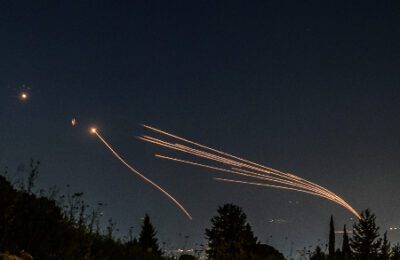 Cataclysmic events overshadow. It is the fate of occurrences preceding or following world-changing events to be forgotten, eclipsed in tumult.
Cataclysmic events overshadow. It is the fate of occurrences preceding or following world-changing events to be forgotten, eclipsed in tumult.
The UN’s World Conference against Racism, Racial Discrimination, Xenophobia and Related Intolerance was such an event, laid to the side. What purported to be a conference engaged in combating racism worldwide, instead quickly became a platform for virulent anti-Semitism, hijacked by a parallel NGO forum.
But one week later, September 11 happened and Durban was almost forgotten — until last year, that is.
After a review conference for April 2009 was announced, a conglomeration of Jewish groups, spearheaded by the American Jewish Committee’s Geneva outpost, UN Watch, decided it would not allow a repeat of 2001’s conference to take place.
The result has been a thorough, concerted and extremely successful effort, coordinated with Jewish student groups from various European countries. A parallel four-day long program of events has been taking place alongside the official conference, focusing not only on anti-Semitism and Israel, but also on anti-racism, human rights, and resistance.
One such event was Wednesday mornings, Conference against Racism Discrimination and Persecution. Bringing together activists from both dimensions those expert in international law and those who suffered directly from recent atrocities the conference provided a multifaceted and harrowing view of human rights suffering.
Victims of Rwanda and Darfur spoke plainly, brutally, fervently. And most striking and horrifying for me was the acute realization has no hierarchy and genocide no uniqueness.
Gibreil Hamid, Darfur survivor and activist for genocide victims, reiterated that this genocide did not begin in recent years.
This is a genocide in slow motion and yet it continues. He recalled seeing — twenty years ago — murdered bodies abandoned on dirt roads. Just two days ago, I was watching a Holocaust documentary, The Final Solution. One image in particular had stayed with me: dead bodies lying on the streets of the Warsaw Ghetto, and passersby continuing, without a glance. Two genocides, but the imagery, the reality, the same.
Ester Mujawayo, a survivor of Rwanda, recounted how radio was used by Hutus to carry out genocide and incite ordinary citizens to participate. Is this not what Hitler did during the 1930s, when the radio was first becoming a widespread medium? She told us about how Tutsis were compared to cockroaches, to snakes. Is this not what the Nazis did, depicting on film imagery of scurrying rats then cutting in images of pious Jews?
And the silence. The culpability of the world community. Then, and now, today. The same.
Alongside the panels comprised of first-person accounts of persecution, were impassioned speeches from activists and politicians decrying the Durban Review Conference, and especially Iranian president Mahmoud Ahmadinejads keynote address.
The keynote speaker, Bernard-Henri Lévy, internationally renowned French philosopher and writer, called the conference a masquerade, stating that the draft declaration agreed to on Tuesday at the Durban Review Conference, a text that in essence states that the UN does not approve of racism, is the lowest common denominator of human rights, but is being portrayed as a great victory against racism.
He bemoaned the mockery being made of the great ideals of the UN and of human rights [culminating] in a meager result, what a failure, a masquerade.
Lévy spoke bitterly of the hopes dashed, the expectations not met, the disappointment, the betrayal. Of the Rwandan ambassador to the UN, for example, who, speaking at Yom HaShoah commemoration event, expressed his dismay that instead of progress against racism, the conference had instead allowed a killer of homosexuals, an imprisoner of women to take center stage.
Throughout his speech, Levy sported a wristband with a bright red clown nose, referencing and paying tribute to the French Jewish students, heads topped with brightly colored clown wigs, that interrupted and heckled Ahmadinejads speech on Monday.
Irwin Cotler, former Canadian minister of Justice and an expert in international law, criticized all states party to the convention on the prevention of genocide for not reporting Ahmadinejad for his statements calling for the annihilation of Israel.
“He should be standing in the docket of the accused, not at the podium,” Cotler thundered.
A conference on racism and xenophobia that is prepared and opened by countries the likes of Iran, Libya, Pakistan and Cuba is, as Lévy said, a masquerade, symbolized perfectly by the French students.
Underlying both speeches was the probing and frightening question: Who are the real victims of this hijacked conference?
This is not just about rhetoric. What happens to those suffering from persecution in countries and wars that the UNs Human Rights Council has ignored.
With its singular focus on Israel, the Human Rights Council has allowed human rights violates to, in Cotler’s words, ”Have enjoyed exculpatory immunity from international law.”
Or, as Lévy posed as a question, ”What happens when you are the victim of a forgotten war, or a Christian victim, when you don’t fall under the great conflict of Israel-Palestine?”
At a Yom HaShoah commemoration on Monday night here in Geneva, Elie Wiesel said, ”I have not felt the way I feel now since 1945.”
While such a statement can easily be taken pessimistically, the slew of events that have taken place here in Geneva, and the words and activities of the human rights victims who shared their stories, remind us that action can and must be taken.
”The loudmouths meaning Ahmadinejad don’t win,” said Ester Mujawayo, the Rwandan genocide survivor,” but the united voices of many, voices of those told to fight injustice, can win the battle. In what seems to counter all logic, its Adolf Hitler that gives her hope. He attempted to eliminate all Jews. And he didn’t succeed. Ultimately, evil doesnt prevail.”
As I finish this article, I am readying to join a group of Israel supporters, heading toward to the Place des Nations, rallying for Israel. Numbered among us are Alan Dershowitz, Natan Sharanksy and Irwin Cotler.
Search the IJN using the term Durban, and find all of our stories on the UN conference. Related commentary is on our blog, Rocky Mountain Jew.
















